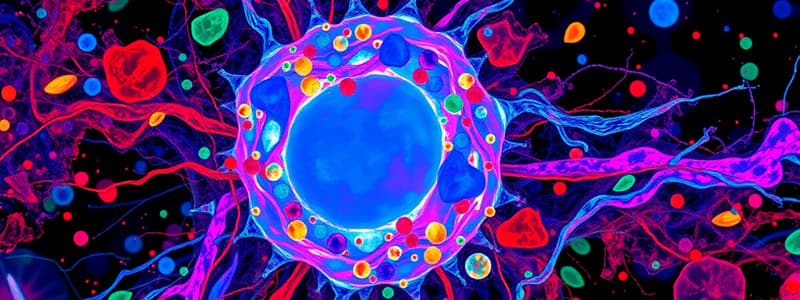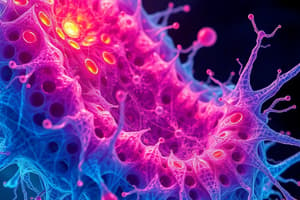Podcast
Questions and Answers
What is the primary function of the nucleus in a cell?
What is the primary function of the nucleus in a cell?
- Energy storage
- Control cell activities (correct)
- Transport materials
- Protein synthesis
Which type of microscope utilizes a beam of electrons for magnification?
Which type of microscope utilizes a beam of electrons for magnification?
- Scanning electron microscope
- Compound microscope
- Electron microscope (correct)
- Light microscope
What is the total magnification power if the ocular lens is 10x and the objective lens is 50x?
What is the total magnification power if the ocular lens is 10x and the objective lens is 50x?
- 200 times
- 1500 times
- 500 times (correct)
- 1000 times
Which of the following is a characteristic of prokaryotic cells?
Which of the following is a characteristic of prokaryotic cells?
What is the role of lysosomes in a cell?
What is the role of lysosomes in a cell?
Which structure is responsible for cellular respiration and ATP formation?
Which structure is responsible for cellular respiration and ATP formation?
What is the primary function of the endoplasmic reticulum in a cell?
What is the primary function of the endoplasmic reticulum in a cell?
Which of the following pairs correctly identifies the two types of endoplasmic reticulum?
Which of the following pairs correctly identifies the two types of endoplasmic reticulum?
What is the role of ribosomes within a cell?
What is the role of ribosomes within a cell?
Apoptosis is primarily important for which developmental process?
Apoptosis is primarily important for which developmental process?
What is a primary distinction between prokaryotic and eukaryotic cells?
What is a primary distinction between prokaryotic and eukaryotic cells?
Which of the following accurately describes the Scanning Electron Microscope (SEM)?
Which of the following accurately describes the Scanning Electron Microscope (SEM)?
Which organelle is responsible for the majority of energy storage within a cell?
Which organelle is responsible for the majority of energy storage within a cell?
What is the primary function of the Golgi Complex in cellular biology?
What is the primary function of the Golgi Complex in cellular biology?
Which component within the cell is classified as an organelle that handles waste and damaged organelles?
Which component within the cell is classified as an organelle that handles waste and damaged organelles?
Flashcards are hidden until you start studying
Study Notes
Cell Nucleus
- The nucleus is the control center of the cell, housing genetic material (DNA).
- It regulates gene expression and mediates the replication of DNA during the cell cycle.
Electron Microscope
- The transmission electron microscope (TEM) and scanning electron microscope (SEM) utilize a beam of electrons for high magnification.
Total Magnification
- Total magnification power is calculated by multiplying the ocular lens power by the objective lens power (10x ocular × 50x objective = 500x total magnification).
Prokaryotic Cells
- Prokaryotic cells are characterized by the absence of a membrane-bound nucleus and organelles.
Lysosomes
- Lysosomes function as the cell's waste disposal system, breaking down macromolecules, old cell parts, and microorganisms.
Mitochondria
- Mitochondria are responsible for cellular respiration and ATP formation, providing energy for cellular activities.
Endoplasmic Reticulum
- The endoplasmic reticulum (ER) synthesizes proteins and lipids; it is involved in processing and transporting these molecules within the cell.
Types of Endoplasmic Reticulum
- The two types of endoplasmic reticulum are rough ER, which has ribosomes attached and is involved in protein synthesis, and smooth ER, which is involved in lipid synthesis and detoxification.
Ribosomes
- Ribosomes are the cellular structures where protein synthesis occurs, translating messenger RNA (mRNA) into polypeptides.
Apoptosis
- Apoptosis, or programmed cell death, is crucial for development, aiding in processes like tissue remodeling and removing damaged cells.
Prokaryotic vs. Eukaryotic Cells
- A primary distinction is that prokaryotic cells lack a true nucleus, while eukaryotic cells have a defined nucleus and membrane-bound organelles.
Scanning Electron Microscope (SEM)
- The SEM provides detailed 3D images of surfaces by scanning with a focused beam of electrons, enhancing surface topography visualization.
Energy Storage
- The organelle responsible for the majority of energy storage within a cell is the mitochondria, which produces and stores ATP.
Golgi Complex
- The Golgi Complex modifies, sorts, and packages proteins and lipids for secretion or delivery to other organelles, functioning as the cell's shipping center.
Organelle Handling Waste
- Lysosomes manage waste and damaged organelles, using digestive enzymes to degrade materials and recycle cellular components.
Studying That Suits You
Use AI to generate personalized quizzes and flashcards to suit your learning preferences.





